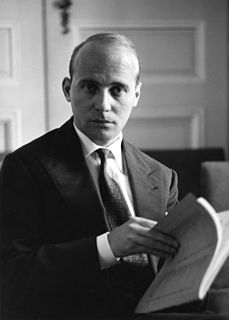Related Research Articles

Le donne curiose is an opera in three acts by Ermanno Wolf-Ferrari to a text by Luigi Sugana after Carlo Goldoni's play of the same name.

I quatro rusteghi is a comic opera in three acts, music by Ermanno Wolf-Ferrari to a libretto by Luigi Sugana and Giuseppe Pizzolato based on Carlo Goldoni's 18th-century play I rusteghi. The opera is written in Venetian dialect, hence "quatro" instead of "quattro".

Il segreto di Susanna is an intermezzo in one act by Ermanno Wolf-Ferrari to an Italian libretto by Enrico Golisciani. The premiere of the opera was in German, in a translation by Max Kalbeck, at the Hoftheater in Munich on 4 December 1909.

Sly, ovvero La leggenda del dormiente risvegliato is an opera in three acts by Ermanno Wolf-Ferrari to an Italian libretto by Giovacchino Forzano, based on the Induction to William Shakespeare's The Taming of the Shrew. Unlike most of Wolf-Ferrari's other operas, this is a tragedy.

Der Prinz von Homburg is a German-language opera in three acts by Hans Werner Henze with a libretto by Ingeborg Bachmann (1926–1973). It was completed in 1958 but premiered on 22 May 1960 in Hamburg.
Dano Raffanti is an Italian tenor, particularly associated with the Italian baroque and bel canto repertory.

Pygmalion is a monodrama in one act by composer Georg Benda with a German libretto by Friedrich Wilhelm Gotter. The opera's first performance was at the Ekhof Theatre, the court theatre in Gotha, on 20 September 1779. Pygmalion was the fourth of the five theatrical collaborations of Benda and Gotter. Gotter based his text on Jean-Jacques Rousseau's 1762 play Pygmalion. Benda's melodrama is unusual as it has no singing roles. Two of the three characters, Pygmalion and Galatea, are spoken roles; the other, Venus, is silently acted on stage.
Erwin und Elmire is a singspiel, described as a Schauspiel mit Gesang, in two acts by the German composer Johann André, with a libretto by Johann Wolfgang von Goethe, after Oliver Goldsmith's ballad of Angelica and Edwin, The Hermit, in chapter 8 of his sentimental novel The Vicar of Wakefield.
Ulisse is an opera in a prologue and two acts composed by Luigi Dallapiccola to his own libretto based on the legend of Ulysses. It premiered at the Deutsche Oper Berlin on 29 September 1968 conducted by Lorin Maazel with Erik Saedén in the title role. Ulisse was Dallapiccola's last opera and took eight years to compose. As in his previous operas, Volo di notte and Il prigioniero, his declared theme was "the struggle of man against some force much stronger than he".

Gustav Hölzel was an Austro-Hungarian bass-baritone and composer who sang in the opera-houses of Austria, Germany and elsewhere for nearly fifty years. He is principally remembered as the first Beckmesser in Richard Wagner's Die Meistersinger von Nürnberg.

La vedova scaltra is an opera in three acts by Ermanno Wolf-Ferrari to a text by Mario Ghisalberti, after Carlo Goldoni's original play first given in 1748.

Giacomo Vaghi was an Italian opera singer who had an active international career from 1925-1956. Along with Tancredi Pasero and Ezio Pinza, he was one of the leading operatic basses of his generation. He possessed a rich voice with a dark timbre that drew him particular acclaim in the operas of Giuseppe Verdi. He appears on several complete opera recordings made with EMI Classics and Cetra Records.
Serafino Amedeo De Ferrari was an Italian composer, conductor, organist, and pianist. He is best known for his operas, of which his most popular were Pipelè (1855) and Il Menestrello (1859).
Andrea Bellini was an Italian operatic bass who had an active career performing in Italy's major opera houses from the 1840s through the 1870s. He specialized in the buffo repertoire and was most often heard in comprimario roles.

L'amore medico is an opera in two acts by composer Ermanno Wolf-Ferrari. Based on Molière's comedy L'Amour médecin, the work uses an Italian language libretto by Enrico Golisciani. It premiered in a German version by Richard Batka on 4 December 1913 at the Hoftheater in Dresden under the title Der Liebhaber als Arzt.

Friedrich Weidemann was a German baritone who was a leading singer at the Vienna Court Opera from 1903 until his death.
Rodolfo Ferrari was an Italian conductor.

Maria Carbone was an Italian operatic soprano. She created the lead female roles in two of Gian Francesco Malipiero's operas: the title role in Ecuba and Cleopatra in Antonio e Cleopatra.
Gli dei a Tebe is an opera in three acts by Ermanno Wolf-Ferrari on a libretto by Mario Ghisalberti, performed for the first time at the Opernhaus in Hannover on 4 June 1943. The first performance used the translation of the libretto in German by Franz Rau. Ghisalberti had in turn derived the libretto from a work by the publisher Ludwig Strecker, who wrote librettos under the pseudonym Ludwig Andersen.

Josef Ichhäuser(1852–1920), known by the stage name Josef Josephi (also spelled Joseffy), was a Polish-born singer (tenor-baritone) and actor.
References
- ↑ Casaglia, Gherardo (2005). "Friedrich Brodersen" . L'Almanacco di Gherardo Casaglia (in Italian).